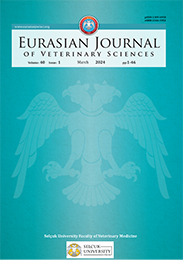| 2019, Cilt 35, Sayı 1, Sayfa(lar) 044-048 |
| [ Türkçe Özet ] [ PDF ] [ Benzer Makaleler ] |
| Investigation of the in-vitro effect of Lactobacillus acidophilus and Lactobacillus casei on biofilm genes of methicillin-resistant and methicillin-sensitive Staphylococcus aureus |
| Hikmet Dinç1, Mehmet Demirci2, Akın Yiğin3 |
| 1Harran Üniversitesi Veteriner Fakültesi, Farmakoloji ve Toksikoloji Anabilim Dalı, Şanlıurfa, Türkiye 2Beykent Üniversitesi, Tıp Fakültesi, Tıbbi Mikrobiyoloji Anabilim Dalı, İstanbul Türkiye 3Harran Üniversitesi, Veteriner Fakültesi, Genetik Anabilim Dalı, Şanlıurfa, Türkiye |
| Keywords: S. aureus, biofilm, Real-time PCR, probiotic |
| Downloaded:707 - Viewed: 2104 |
|
Aim: Staphylococcus aureuss biofilm ability which control via
icaA and icaR gene is a serious problem in the treatment of infections.
Aim of this study was to investigate in-vitro effects of
important probiotic L. acidophilus and L. casei on the icaA and
icaR genes expressions of the MRSA and MSSA strains.
Materials and Methods: In this study, to determine the icaA and icaR gene expressions, 6 tubes in probiotics were prepared. Incubated at 37°C in 5% CO2 medium. RNA isolations were performed at the 6th, 12th, and 24th hours of incubation. After cDNA synthesis, real-time PCR with primers specific for icaA, icaR and 16S rRNA genes were studied. The results were calculated with delta delta Ct method. Results: S. aureus ATCC 43300 (MRSA) and S. aureus ATCC 29213 (MSSA) icaA gene and icaR gene expressions showed down regulation and upregulation respectively after encountering L. acidophilus and L. casei. The icaA and icaR gene expression ratios determined at 12 hours and 24 hours were found to be similar in both MRSA and MSSA strains. Conclusion: This study was the first study to investigate effect of L. acidophilus and L. casei strains on biofilm gene expression of the S. aureus strains by the real-time PCR method. It was determined that L. acidophilus and L. casei were able to alter icaA and icaR gene expression by affecting the MRSA and MSSA strains in-vitro. We believe that the antibiotic properties of these probiotic strains may be a new treatment option against S. aureus biofilm infections. |
| [ Türkçe Özet ] [ PDF ] [ Benzer Makaleler ] |




